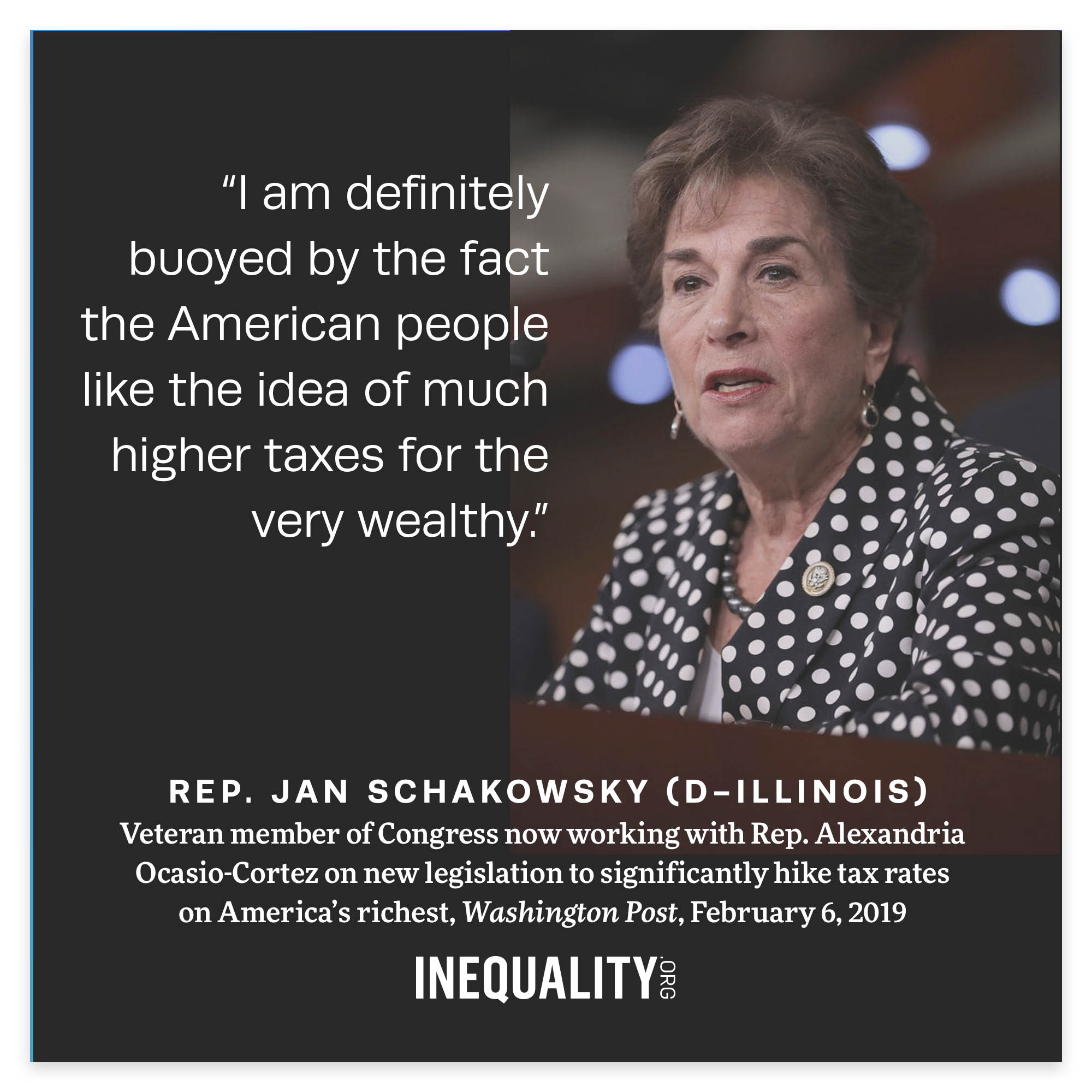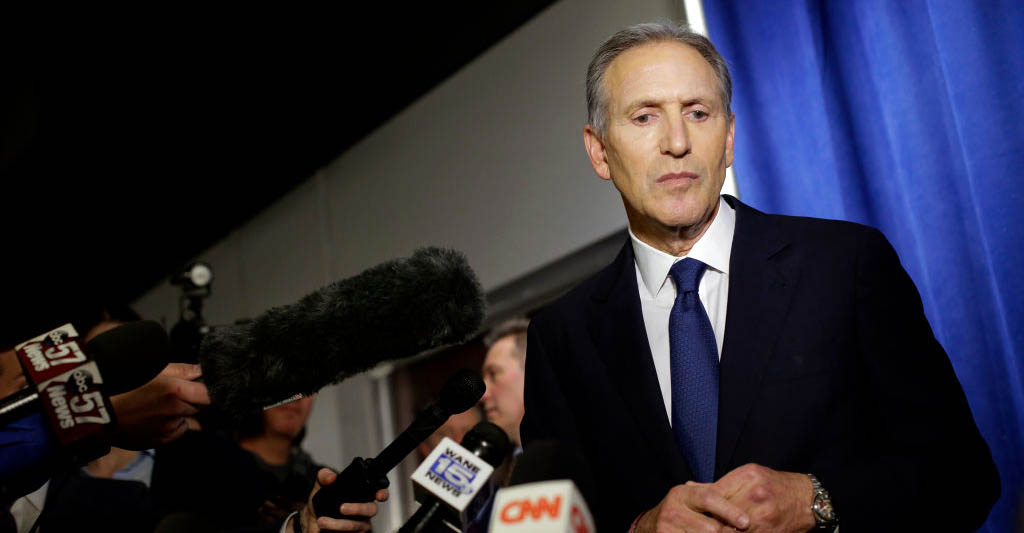Former Starbucks CEO (and current White House hopeful) Howard Schultz is trying to rebrand billionaires as “people of means,” a not-so-subtle attempt to gloss over how dramatic our economic divides have become — and a sign our richest are worrying about shifting public attitudes about grand fortune.
|
THIS WEEK
|
|
The inequality debate has advanced by leaps and bounds over the last several weeks. One sign of how far we’ve come: Former Starbucks CEO (and current White House hopeful) Howard Schultz is trying to rebrand billionaires as “people of means,” a not-so-subtle attempt to gloss over how dramatic our economic divides have become — and a sign our richest are worrying about shifting public attitudes about grand fortune.
The online world, for the most part, laughed about the Schultz maneuver. But economist Tyler Cowen wrote a lengthy defense asking the public not to “objectify” our economic elite by referring to their wealth. The article appeared on Bloomberg, a news outlet named after its own billionaire founder, Michael Bloomberg, who himself is flirting with a 2020 run. That prospect has the journalists in his employ somewhat less than enthused.
More this week on Howard Schultz and how we can end the age of billionaires and their stranglehold on our civic life.
Chuck Collins, for the Institute for Policy Studies Inequality.org team |
|
|
|
|
INEQUALITY BY THE NUMBERS
|
 |
|
|
|
|
|
|
FACES ON THE FRONTLINES
|
 |
The Youth Movements Taking on the Climate Crisis
|
| Back in 2015, a group of youth warriors bravely filed a lawsuit against the federal government for failing to protect their right to life and liberty by willfully ignoring the dangers of climate change. Last month, the 21 plaintiffs of Juliana v. United States gathered under the same roof at the New York Society for Ethical Culture. The 21 activists convened with leaders of the most powerful movements of our time to share their experiences and discuss what needs to be done to address our climate crisis. Anny Martinez shares this week a dispatch on their discussion. |
|
|
|
|
WORDS OF WISDOM
|
 |
|
|
|
|
|
PETULANT PLUTOCRAT
OF THE WEEK
|
 |
| Decaffeinating This Ego May Be a Really Heavy Lift |
| For billionaire Howard Schultz, the promo tour for his new book — a prelude to his “centrist-independent” bid for the White House — hasn’t been going so well. At Purdue University last week, students reacted with stone silence to what Schultz clearly considered a big applause line. After a pause, Schultz told the students “you gotta clap for that.” A few days earlier, in New York, journalist Andrew Ross Sorkin asked Schultz if America’s rich had too much clout. Tweeted one observer, political analyst Anand Giridharadas: “You haven’t lived until you’ve seen Howard Schultz’s facial muscles react” when asked “if billionaires have too much power.” Schultz is learning that in public life, unlike corporate boardrooms, your targets can shoot back, as Senator Elizabeth Warren did after the Starbucks mogul called her new wealth tax proposal “ridiculous.” Retorted Warren: “What’s ‘ridiculous’ is billionaires who think they can buy the presidency to keep the system rigged.” |
|
|
|
|
GREED AT A GLANCE
|
 |
|
|
|
|
|
|
TOO MUCH
|
 |
| Can Stiff Taxes on High Incomes Be Sustainable? |
| In just a month, the bold Alexandria Ocasio-Cortez move to propose a 70 percent top tax rate — a rate unimaginable in polite circles just weeks ago — has liberated other much more veteran members of Congress to go as bold on taxing the rich as they have long yearned to go. That couldn’t be better news. Today, at a time of intense income and wealth concentration, we need to be bold — on multiple tax fronts. We need, as Rep. Ocasio-Cortez has proposed, to restore the top marginal tax rates that did so much in the middle of the 20th century to check grand fortune. But we can’t be content to just recreate that mid-century progressive tax structure. We need to do what egalitarians back then could not do. We need to make steep top rates politically sustainable over the long haul. Inequality.org co-editor Sam Pizzigati, author of The Case for a Maximum Wage, has more. |
|
|
|
|
|
|
MUST READS
|
This week on Inequality.org
Nathan Jensen and Calvin Thrall, Amazon HQ2: Texas Experience Shows Why New Yorkers Should Be Skeptical. All about the photo-op politicians who do little to make sure firms comply with public incentive agreements.
Elsewhere on the web
Farhad Manjoo,
Abolish Billionaires, New York Times. A radical idea is gaining adherents.
Josh Hoxie, How the Age of Billionaires Ends, OtherWords. A look at some real solutions for our inequality crisis now on the political table.
Meagan Day, Bernie Against the Billionaires, Jacobin. Why billionaires have no justification for their existence.
Oliver Wainwright, Super-tall, super-skinny, super-expensive: the 'pencil towers' of New York's super-rich, Guardian. A deep dive into the primo plutocratic symbol of our time.
John Crisp, Don’t be embarrassed to ‘soak the rich,’ Rochester Post Bulletin. The wealthy should pay more because they benefit the most from our common national enterprise.
Enrico Bergamini, The American tax debate, Breugel. An excellent blow-by-blow summary of the points policy wonks are making in the vibrant new debate over taxing the super rich.
Rex Nutting, Billionaires haven’t earned all they have, MarketWatch. How most wealth comes from extracting unearned rents from the rest of us.
Matthew Klein, Understanding Elizabeth Warren’s Wealth Tax, Barron’s. A sound rebuttal to the proposal’s critics.
Lambert Strether, Why Not Start Saving the Biosphere by Outlawing Private Jets? Naked Capitalism. Over 1,500 luxury jets carried deep pockets to last month's World Economic Forum in Davos.
Christopher Ingraham, People like the estate tax a whole lot more when they learn how wealth is distributed, Washington Post. A report on some fascinating new research.
|
|
|
|
|